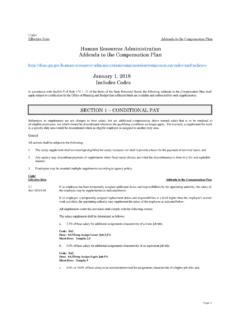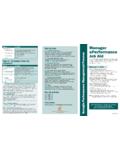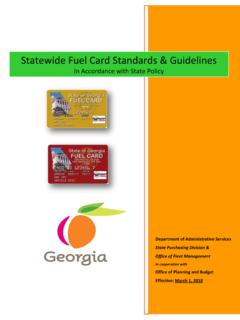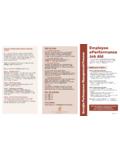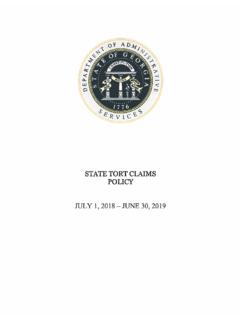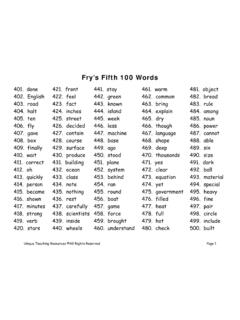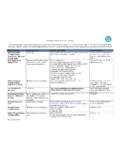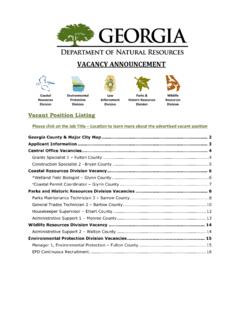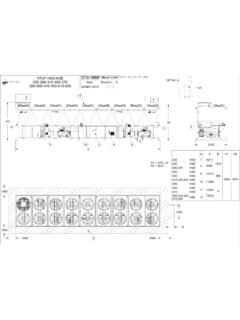Transcription of RULES OF THE STATE PERSONNEL BOARD
1 Page 1 of 38 _____ RULES OF THE STATE PERSONNEL BOARD Absence from Work Revision Date: 01/09/2017 (1) Introduction: The STATE recognizes value in providing a reasonable amount of time off to assist employees with balancing work and personal needs. To be a responsible steward of public funds, however, the STATE must account for any pay provided to employees for time not worked. Paid time off must be charged to appropriate paid leave, accumulated compensatory time, paid holiday time, or suspension with pay. This Rule defines the available types of paid and unpaid leave and the eligibility for each. It further provides a framework for leave, compensatory time, and holiday administration. Information about paid suspension is available in Rule , Changes to Employment Status, and more detailed information about compensatory time can be found in statewide policy #7 RULES , Regulations, and Procedures Governing Working Hours, the Payment of Overtime, and the Granting of Compensatory Time, jointly issued by the Governor s Office of Planning and Budget and the Department of Administrative Services.
2 (2) Applicability: (a) The policies and procedures described in this Rule apply to all agencies of the Executive branch, excluding the BOARD of Regents of the University System of Georgia. (b) In accordance with STATE law ( 45-20-32), Section (18) of this Rule, Education Support Leave, is applicable to all branches and entities of STATE government. (3) Definitions: For the purposes of this Rule, the following terms and definitions apply in addition to those in Rule , Terms and Definitions: (a) Administrative Leave means paid time off for specified reasons defined in STATE law. This paid time off is not charged to accrued leave, and the duration is defined in applicable statute. (b) Immediate family means the employee s spouse, child, parent, grandparent, grandchild, brother, and sister, including active step and in-law relationships.
3 Immediate family also includes any other person who resides in the employee s household and is recognized by law as a dependent of the employee. Page 2 of 38 _____ RULES of the STATE PERSONNEL BOARD Revision Date: 01/09/2017 (c) Seasonal activity means work during periods of significantly increased demand, which are of a regular and recurring nature. (d) Workday means a day an employee is regularly scheduled to work. (4) General Leave Administration Provisions: (a) Each agency should establish procedures for employees to request and receive approval for absence from work. (b) Employees are expected to properly request and receive approval for absence from work. Failure to follow the employer s procedures may result in denial of the request and/or other employment action deemed appropriate by the agency, up to and including termination of employment.
4 (c) If a request for absence is denied, the employee is expected to work, as scheduled. Failure to do so might result in leave without pay and/or other employment action deemed appropriate by the agency, up to and including termination of employment. (d) The agency may require an employee on leave with an uncertain end date to provide periodic reports during the leave regarding the employee s status and intent to return to work. (e) An employee absent on official agency business is not considered to be on leave. (f) An employee is expected to return to work as scheduled at the expiration of approved absence. If an extension is desired, the employee must request it in writing from her/his supervisor prior to the leave expiration or adhere to other agency procedures for timely requesting an extension.
5 (g) Failure to obtain approval for additional time off beyond the expiration of an approved absence may result in separation from employment or other employment action deemed appropriate by the agency. (h) Each agency may, as a condition of return, require an employee who is absent from work because of illness or injury to supply an appropriate medical release or certification that the employee is able to return to work. The release or certification must explain the extent to which the employee is able to perform the essential functions of her/his position, with or without reasonable accommodation. 1. Each agency must comply with the requirements of the Americans with Page 3 of 38 _____ RULES of the STATE PERSONNEL BOARD Revision Date: 01/09/2017 Disabilities Act, as amended, including providing reasonable accommodation to its qualified employees with disabilities.
6 2. A limitation exists for employees returning to work from using intermittent or reduced schedule Family and Medical Leave. An agency may require fitness-for-duty certification only if the agency reasonably believes the return could pose significant risk of harm to the employee or others. Such certification may be required no more often than every 30 calendar days. 3. If the medical certification does not release the employee to perform essential functions, and there is no available reasonable accommodation, as defined in the Americans with Disabilities Act, as amended, or if the employee fails to provide the required release, the agency may take the employment action it deems appropriate, up to and including termination of employment. (i) Prior to engaging in other employment, including self-employment, while on leave employees must comply with the notice and other requirements set forth in Rule , Outside Employment.
7 (j) Misrepresenting reasons for requesting or continuing an absence may result in disciplinary action, up to and including termination of employment. (k) Exceptions to this Rule will occur if necessary to comply with applicable laws. (5) Types of Paid Leave: (a) The STATE s paid leave program offers a combination of accrued, personal, and administrative leave for eligible employees. (b) The following employees are not eligible for any paid leave benefits: 1. All temporary employees, 2. All hourly employees, and 3. Active, salaried, non-temporary employees who are rehired retirees of the Employees Retirement System of Georgia (ERS) while receiving retirement annuity payments during the first 1,040 hours of work performed in the calendar year. Page 4 of 38 _____ RULES of the STATE PERSONNEL BOARD Revision Date: 01/09/2017 Eligibility for other employees is defined in the applicable leave section within this Rule.
8 (c) Accrued Leave: 1. Accrued leave includes annual leave and sick leave. Both annual and sick leave are earned based on time in pay status and automatically accrue to eligible employees. (See Section (6) Annual Leave and Section (7) Sick Leave of this Rule). 2. Each agency, by written policy, may set a minimum period of annual and/or sick leave to be charged for any use which is only a fraction of that period. The minimum leave period cannot be greater than 15 minutes. 3. Dual Eligibility Relating to Leave Accrual: (i) An employee who is simultaneously employed in two different agencies and is entitled to earn leave under each position s/he holds will independently accrue leave in accordance with each agency s policies. (ii) If employment is terminated with one agency but not the other, all leave accruals will be combined and available in the remaining position, provided both agencies use the same leave accrual program.
9 An exception applies when one of the agencies is a Community Service BOARD , County BOARD of Health, or BOARD of Health Community Operated Program. Leave accrued in these organizations cannot be transferred to an Executive Branch agency. (iii) If the leave programs differ or if leave cannot otherwise transfer, the terminating agency will payout/divest the employee s leave as provided in the Annual, Sick, and Personal Leave sections of this Rule. (d) Administrative Leave: STATE law provides paid administrative leave to eligible salaried employees for certain activities. Such leave is in addition to, and not charged against, an employee s accrued leave. Administrative leave is available for/during the following: 1. Absence Due to Emergency Office Closures (See Section (12) of this Rule.)
10 , 2. Blood Donation Leave (See Section (13) of this Rule.), Page 5 of 38 _____ RULES of the STATE PERSONNEL BOARD Revision Date: 01/09/2017 3. Bone Marrow Donation Leave (See Section (14) of this Rule.), 4. Organ Donation Leave (See Section (15) of this Rule.), 5. Court Leave (See Section (16) of this Rule.), 6. Employee Voting Leave (See Section (17) of this Rule.), 7. Education Support Leave (See Section (18) of this Rule.), 8. Disaster Volunteer Leave (See Section (19) of this Rule.), 9. Line-of-Duty Injury Leave, also known as Special Injury Leave (See Section (20) of this Rule.), 10. Leave for Contracting TB or infectious Hepatitis on the job (See Section (21) of this Rule.), and 11. Military Leave. (See Rule , Military Leave.)
